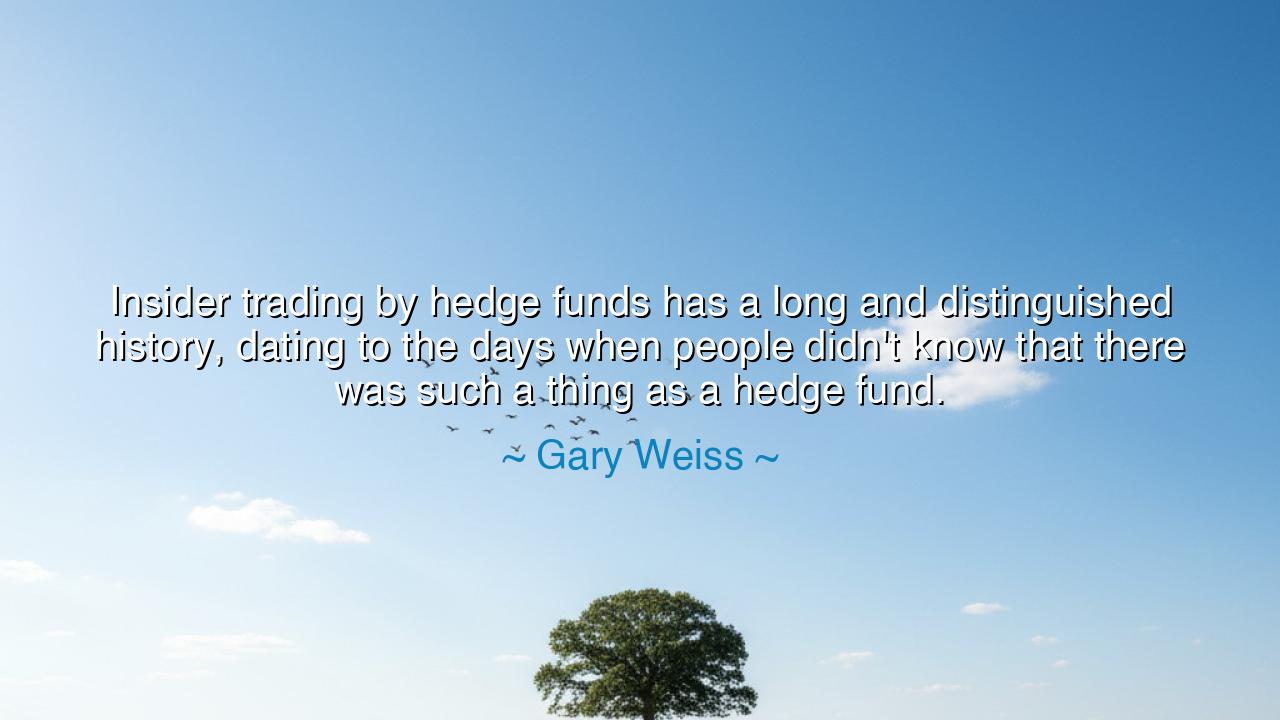
Insider trading by hedge funds has a long and distinguished
Insider trading by hedge funds has a long and distinguished history, dating to the days when people didn't know that there was such a thing as a hedge fund.






The words of Gary Weiss — “Insider trading by hedge funds has a long and distinguished history, dating to the days when people didn’t know that there was such a thing as a hedge fund.” — strike with the irony of a sage observing the folly of his age. Beneath his wry tone lies a profound commentary on the nature of greed, power, and the hidden currents that shape the marketplace. His words do not merely recount the misdeeds of financiers; they speak of something far older — the eternal human temptation to seek advantage without honor, to profit not by creation, but by cunning. It is a truth the ancients knew well: that wherever there is wealth, there will also be corruption lurking in its shadow.
When Weiss speaks of a “long and distinguished history,” he wields the word “distinguished” with irony, for there is nothing noble in deceit. Yet it is a clever reminder that vice often disguises itself as virtue, and that the powerful are skilled in clothing their misconduct in the language of respectability. Insider trading, at its core, is not a modern sin. It is as old as trade itself — the betrayal of trust for personal gain, the turning of knowledge, meant for stewardship, into a weapon of exploitation. The hedge fund, then, is but the latest vessel for an ancient vice. Just as kings once hoarded secrets of grain and gold, modern financiers hoard the secrets of the market, using privileged knowledge to outpace the many and enrich the few.
In the ancient world, too, such deceit flourished. Consider the tale of Thales of Miletus, the philosopher who, foreseeing a great olive harvest, secretly rented all the olive presses in advance, cornering the market when the season came. Though history records this act as clever foresight, it bears the same seed of opportunism that Weiss condemns. Thales did not create wealth; he captured it by exploiting his knowledge of future events. Thus, even wisdom, when turned inward toward greed, becomes cunning. The form may change — from olive presses to stock exchanges — but the essence remains: the manipulation of hidden knowledge for personal ascendancy.
What Weiss reveals, then, is not simply a commentary on the finance industry, but a reflection on human nature itself. The hunger for secret advantage is born from the belief that the rules do not apply to oneself — that one may outsmart justice, that the gods of consequence will not see. Yet history, relentless and cyclical, proves otherwise. Every age of excess meets its reckoning: the collapse of markets, the fall of empires, the ruin of reputations built on deceit. What begins as cleverness ends as downfall. For though wealth may be gained in darkness, it cannot endure without truth.
Let us remember, too, the cautionary story of Charles Ponzi, whose name has become eternal shorthand for fraud. His schemes dazzled the public with promises of wealth, yet they were nothing more than mirrors reflecting greed back upon itself. Ponzi’s rise and fall illustrate Weiss’s truth — that financial deceit thrives best when hidden beneath complexity, when the crowd is too entranced by gain to question its source. So too with insider trading: it feeds upon silence and confusion, growing strong in the shadows of jargon and secrecy. But, as the ancients warned, “Nothing hidden remains so forever.”
And yet, Weiss’s observation also carries a subtle warning for the innocent. The “long history” of corruption endures because it is met too often with apathy or awe. Men worship wealth even when it is ill-gotten, and they excuse deceit when it succeeds. Thus, the cycle continues, generation after generation. The marketplace becomes a theater where the cunning are applauded and the honest overlooked. It is here that the true danger lies — not merely in the corruption of individuals, but in the corrosion of values. When a society learns to admire deceit, it loses the very soul of its prosperity.
The lesson in Weiss’s words is clear: the pursuit of wealth must never eclipse the pursuit of integrity. Knowledge, in any form — whether of the stars, the harvest, or the market — is sacred, and to use it unjustly is to profane it. The wise man, like the just merchant of old, builds not upon secrecy, but upon fairness and labor. Let the young who enter the modern halls of finance remember: it is better to earn little with honor than to gain much with deceit. For the wealth won by corruption is not prosperity, but burden — a golden chain that grows heavier with every dishonest act.
So, take these words as both warning and wisdom. The “long history” of greed is written by those who thought themselves untouchable; the history of honor, by those who chose integrity over ease. Let every generation decide which story it will add to. Seek not the shadowed profits of the cunning, but the enduring wealth of righteousness. For when the gold has tarnished and the markets have fallen silent, it is only truth — not fortune — that stands unbroken through the ages.






AAdministratorAdministrator
Welcome, honored guests. Please leave a comment, we will respond soon